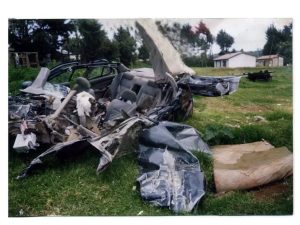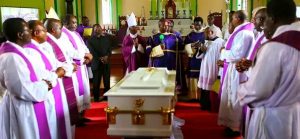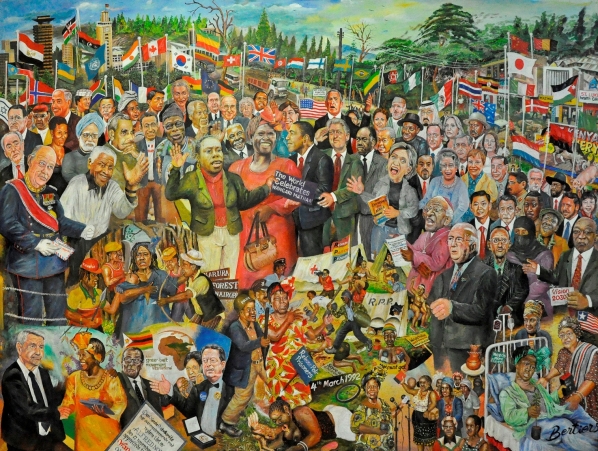By Ogova Ondego and Bobastles Nondi
Published September 23, 2007

Nairobi-based Congolese Christian music recording artist and performer who declared that God had created her purposely to worship Him, Angela Chibalonza Runiga, is dead. The popular Congolese musician perished in a morning road accident at Kinale, on the Naivasha-Nairobi highway, on September 22, 2007. OGOVA ONDEGO and BOBASTLES NONDI pay tribute to this musician whose art touched thousands of listeners and whose first name is translated as Angel.
Up in heaven we will see Jesus Christ our Saviour
Up in heaven we will see Baba Abraham
Up in heaven we will see Isaac
Up in heaven we will see Elijah
Up in heaven we will sing for our Saviour.
Those are some of the words of Angela Chibalonza Runiga Muliri, the gospel artist who declares that God had created her purposely to worship Him, in her album, Yahwe Uhimidiwe (God be Praised).
 When the shocking news of her death filtered across Kenya via radio and television after her death, there was almost a unanimous agreement among grief-stricken and shocked fans that Chibalonza is “going straight to see her heavenly father and ancestors as she had foreseen”, if her dedication to God through her divine praise and worship songs is the key to heaven.
When the shocking news of her death filtered across Kenya via radio and television after her death, there was almost a unanimous agreement among grief-stricken and shocked fans that Chibalonza is “going straight to see her heavenly father and ancestors as she had foreseen”, if her dedication to God through her divine praise and worship songs is the key to heaven.
Some said that Chibalonza, whose first name, Angela, means angel, “has been called to go and lend her voice to the angels in praise of God up in heaven. For why else would such a talented person die when she was just maturing into her trade and life?”
A recording artist with popular albums that sold well across the Kiswahili-speaking eastern and central Africa, the late Chibalonza had endeared herself and warmed her way into the hearts of hundreds of music lovers, even among those that do not profess Christianity, through her rich and full throttle soulful vocals in a style of music popularly known as Praise & Worship that she delivered through live performances in churches and at open-air public Christian meetings known as crusades in most African nations, and also through her music albums that sold in Kenya, Uganda, Tanzania, Congo, Zambia, Mozambique, Zimbabwe and in other parts of the world where Kiswahili, Lingala and French are spoken.
RELATED: Uganda’s Dynamic Adungu Troupe Brings Alur Music, Dance and Traditions to the World
 Runiga, who was wife to Elisha Muliri, a pastor, since 2003, perished when the car she and her driver, Kennedy Aluoch, and vocalist, Nimrod Makori, were travelling in back to Nairobi from a performance at Egerton University in Njoro, rammed into a stationary lorry on Saturday morning.
Runiga, who was wife to Elisha Muliri, a pastor, since 2003, perished when the car she and her driver, Kennedy Aluoch, and vocalist, Nimrod Makori, were travelling in back to Nairobi from a performance at Egerton University in Njoro, rammed into a stationary lorry on Saturday morning.
Singing mainly in the musically-rich Lingala and Kiswahili and at times in French, Runiga, who cut her teeth with Nikuabudu (I Worship You) album in 1997, was set to release her latest album, Nimekutana na Yesu (I have Met With Jesus), at Nairobi Cinema in Nairobi, on September 29, 2007. Runiga also sang in languages like Luganda to cut across language barriers. Oh Yesu Wange off her Ninapotembea (Whenever I Walk) album, for instance, is in Luganda.
Angela Chibalonza Runiga was born on November 26, 1976 in Bukavu, eastern Congo-Kinshasa. She said she enjoyed music right from her childhood. After completing secondary school in 1996, Chibalonza moved to Kenya the following year in what she described as her response to a call from God to serve Him in the 35-million East African country and also to pursue her music career.
 Though she had sang in the choir and even risen to choir leadership since 1992 when she said she got saved aged 15 years, Chibalonza had not recorded any music in her native Congo. Thus her travel to Nairobi to embark on a music career was appreciated and encouraged by her Christian parents and 10 siblings.
Though she had sang in the choir and even risen to choir leadership since 1992 when she said she got saved aged 15 years, Chibalonza had not recorded any music in her native Congo. Thus her travel to Nairobi to embark on a music career was appreciated and encouraged by her Christian parents and 10 siblings.
Upon getting to Kenya, the budding musician released her maiden album, Nikuabudu. She followed it up with Jina la Yesu (The Name of Jesus) the following year, in 1998. Come 1999, she released Mwisho wa Dunia (End of the Time) and then Ninapotembea (Whenever I Walk).
This was quite a coup for the young Congolese who was barely 21 when she arrived in Nairobi and had to quickly learn Kiswahili so she could compose and perform in the national language of Kenya where Christian (known as gospel) music reigns.
At the time she arrived in Nairobi I, Ogova Ondego, was working with Nation Media Group’s Nation Newspapers Division in Nairobi and I had the privilege to interact with her and see her budding talent bloom. We would have our interview in the newsroom and then I would escort her to the bus stop to get her transport back home. Before that we would have a snack and the second born of 11 children of the Runiga family would do some more talking as I listened. It almost became a ritual that whenever she came to the media house, she would first go to the sixth floor for radio and television interview before coming down to the newspaper room on the third floor for our chat.
RELATED: Taarab Music under Scrutiny as Commercialism Wrestles with Artistry
It goes without saying that the quality of Nikuabudu, particularly the sound-mixing, was so bad that she wanted to redo it, she said, but that she failed to persuade the then four main producers of Christian music–Japheth Kassanga, Gabriel Torome, Kimani Thomas and Albert Gacheru–to handle the project. She settled for a little known production outfit and then moved on despite what she referred to as ‘exploitation by producers’.
 On my suggestion that she seeks legal redress, Runiga had retorted repeatedly, “I want my work to be promoted and so I didn’t want to get at loggerheads with producers.”
On my suggestion that she seeks legal redress, Runiga had retorted repeatedly, “I want my work to be promoted and so I didn’t want to get at loggerheads with producers.”
Chibalonza repeated this message soon after returning to Nairobi from Kampala where she had fallen ill while pursuing pirates who were selling her Nikuabudu and Jina la Yesu albums. She said she had haggled with the pirates who had reluctantly paid her USh1 million (about US$569) to prevent her from taking legal action against them.
Instead of being supported, Chibalonza had said, her Nairobi producer, Artpoint Productions, had been so furious with her over the Kampala incident that, she said, they had refused to pay her any more royalties.
Out of frustration but not desperation, Chibalonza had said she was looking for money to reclaim her two albums from the producers who had bought them for Sh25000 (about US$385) apiece and “I have no right to either Nikuabudu or Jina la Yesu.”
“I am a foreigner here. I fear that I could be thrown out by Kenyans if I demand my rights. I am a Christian. God sent me here to serve Him. He will fight for me,” said Runiga, revealing that she was two months behind on rent for her Buru Buru rental house and that “I am just depending on hand-outs to survive in Nairobi.”
“Whenever I go out to sing at crusades, I have to buy copies of my music from my producer in order to sell them. I don’t even have bus fare, let alone a bank account while my producer prospers.”
RELATED: Daniel arap Moi Used the Power of Choral Music to Rule Kenya
 Buoyed on by her conviction that God had called her “to minister to Kenyans through music”, Runiga did not give up. “I am seeing the results of this God’s work through people’s lives,” she said.
Buoyed on by her conviction that God had called her “to minister to Kenyans through music”, Runiga did not give up. “I am seeing the results of this God’s work through people’s lives,” she said.
Though eastern Congo was troubled even when she arrived in Nairobi, she reiterated she had not fled any socio-political unrest from her country.
“I am famous in Kenya, Uganda, Tanzania and Congo but I have no money to show for it. I am content serving God,” Chibalonza often told me.
But that was before the arrival of Ninapotembea and Yahwe Uhimidiwe that readily connected with music lovers across eastern and central Africa.
Come 2004, the now defunct, and discredited, Kora All Africa Music Awards nominated Chibalonza for Best Gospel Female Artist award for Jubilee, off Yahwe Uhimidiwe album. She did not win but it was clear that her talent was now in the public domain.
Having watched her from the formative stage of her creativity, I have little doubt that her passing on on September 22, 2007 has robbed humanity of a great composer, singer and recording artist.
In her Kora nomination profile, the musician says, “Jina la Yesu made history in my musical career; it made me the Angela I am today. I got to be known in Kenya and in East and Central Africa. I have released other albums like Ninapotembea, Nzambe Papa, and Nakuabudu. Yahwe Uhimidiwe is the new album I release in January this year. It contains the song Jubilee, which is the song I have submitted for the Kora All Africa Music Awards 2004.”
Throughout my many years of journalistic work I have tried to be strong. But not over the death of Angela Chibalonza Runiga Muliri. My eyes water while my heart aches as I write this obituary.
While writing articles on Angela Chibalonza in both Kiswahili and English to help support her work, little did I know that I would one day have to write her obituary as well. This is why I am devastated. But I am consoled by the fact that her music—my favourite was Yahwe Uhimidiwe, Yo Ozali Nzambe, Inanibidi Niseme, Uliniumba Nikuabudu—is a gift she has bequeathed humanity.
If the Angela Chibalonza Runiga Muliri who died on September 22, 2007 was the same person that she was in public life, and if she was the same person in private as well as in her church life, then one may pray that the Apostle Paul’s words–as he was led away to the execution after having written half of the New Testament books and helped plant churches on two continents–will ring true in the case of the departed artist as well: “I have fought the good fight. I have finished my course. I have kept the faith.”





